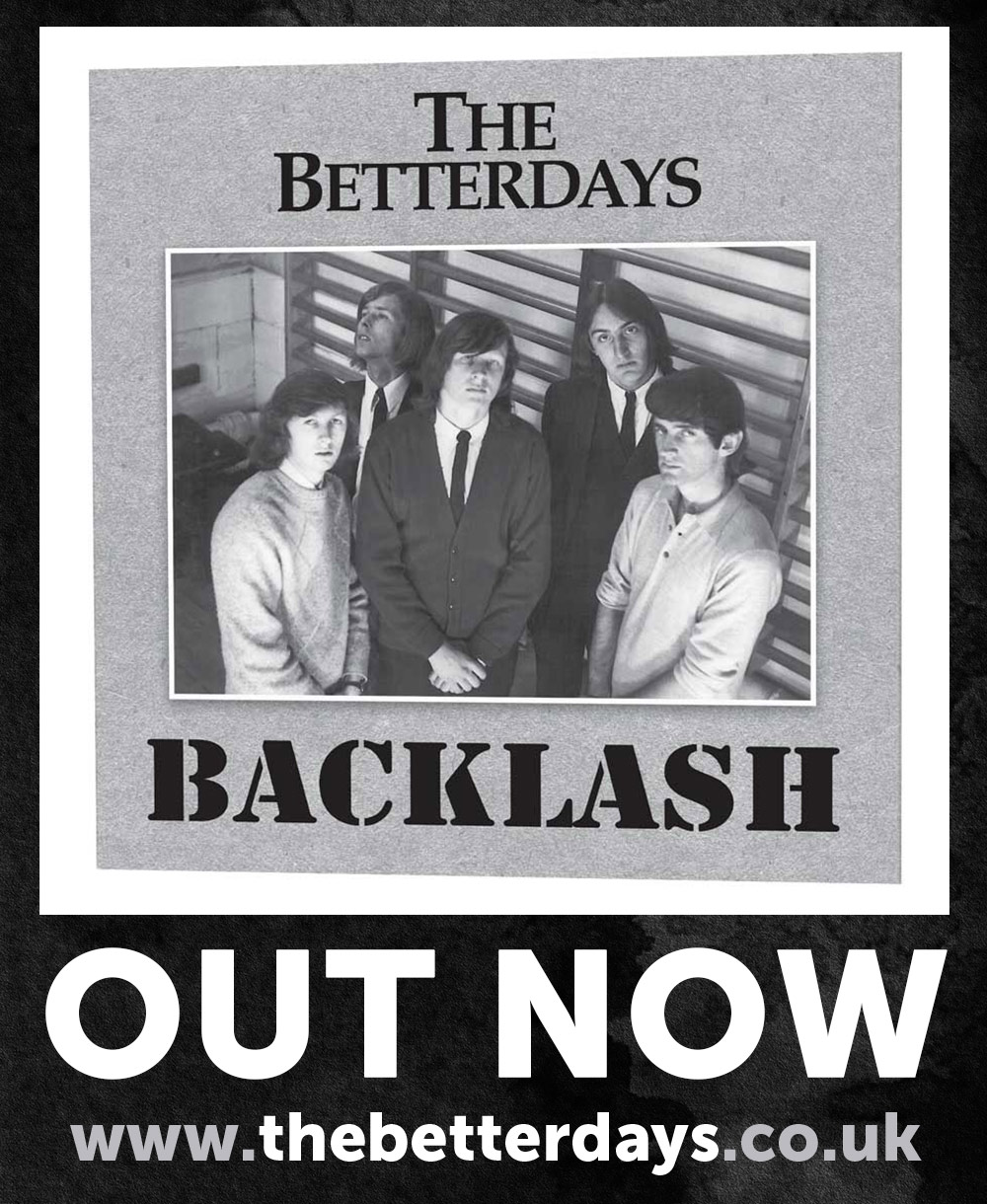 (5 / 5)
(5 / 5)
I was brought up on a diet of many musical genres. My two older brothers were soul boys, and so I used to lay in bed at night while they got ready to go out, soaking up Booker T and the MGs, Otis Redding et al, on the blue and white portable HMV record player on the landing, buzzing away and the valves warming up to the smell I can still recall today.
My sister was into the likes of Mary Hopkin, Carole King, Small Faces (she was in love with Stevie Marriott) and The Monkees (she was in love with Davy Jones, two-timing Stevie Marriot with him!!!) All three played The Beatles singles. I ended up into all sorts of music, and no one genre; mainly because of all the different styles I had heard as a youngster growing up and for that, I am grateful. To emphasise my diverse musical taste from a very young age; the first single I ever bought was Donnie Elbert’s “Little Piece Of Leather”. The first LP was “The Glenn Miller Story”, soundtrack from the film starring James Stewart. I loved Glenn’s music on that film and ordered the record for a birthday or Christmas gift from monies given to me from family.
My Dad loved his jazz and played piano and organ, with an encyclopaedic knowledge of jazz music and artists. Very handy to me in later years when I became a journalist and before the internet, for research. A call to Dad, give him a name and he would be off; churning out fact after fact from his memory and also able to refer to his many books on jazz. He used to record jazz radio shows on his reel to reel gear, and then “dub them” onto cassette tape for me to listen to. Also, lots of obscure jazz and blues artists on TV on his Betamax video recorder, and when he passed away at 69-years-old, I “inherited” (no one else wanted them!) his video and music collection. It was a valuable musical history lesson and resource for me.
My Step-Father was a trumpeter, and played in small and large bands, a top dance orchestra, big bands, recording sessions and live gigs. He had a good reputation for his talent, his cheerful personality and his reliability, and our telephone would often ring in the afternoon or early evening with an S.O.S. call to ask him to “dep” for indisposed players who could not make a gig that night. He had a great LP collection of jazz, and lots and lots of big band stuff. He adored Maynard Ferguson or “Fergie” as he called him, Stan Kenton and Buddy Rich. (I remember being proud to be able to take my Mum and Step-Dad to see a Buddy Rich concert as guests, when a music ‘paper I worked for promoted one of his UK shows.) My Step-Dad was also always abreast of more contemporary horn-soaked bands, and had everything that Blood Sweat and Tears had recorded, which got me into them. He would also collect albums from all the US college bands.
I recall one damp, foggy winter’s night, when I went with him to a rehearsal in a freezing cold school some way from our house, maybe an hour or more, for a new band led by a US band leader and composer Stan Berne (not sure if that is the correct spelling of his surname, to be honest.) I was semi-interested and sat reading a music ‘paper while they began the rehearsal. There were a lot of players. This American had a good command of their attention and would call out the number in the “pad” of the “dots” (music charts) he wanted them to turn to, for each song they would play. It sounded really tight considering this was a new band and a first rehearsal, and many of the guys had never played together before. My old man knew a few of them though.
But for me, the first few tunes were a bit dated for my tastes, and most of them were a slowish tempo. Then a life-changing moment for me……Mr Berne called out a number on the music sheet he wanted to have a crack at next. The band kicked off and my head was soon spinning. This one song and the force of this big band blasting at my ears sent shivers down my spine. After they finished and were all saying how great this tune was, and after Mr Berne congratulated them for how well they played it, I went over to him and asked if he could please tell me what that amazing tune was and who it was by. He stared at me, and gave me a look that to me said; ‘Don’t interrupt us boy, we are working here. Go read your paper!” I was maybe 16-years-old back then. He held up the sheet music and I noted the name of the song. “Don’t Change Horses In The Middle Of The Stream.” But it did not credit the artist (s).
I asked him who had recorded this stunning song. Another death stare and he uttered the immortal words that would start me off on a life-long love affair with this band and their funky soul music. Tower of Power. Tower of mother funking Power. One of the greatest bands on the planet, for me. I meant to write it down, but didn’t. A good while later, I was in a second-hand record store in Leicester and spotted the front of an LP that I liked the look of. A photograph of the Oakland Bay bridge in San Francisco on the cover of the brilliant “Back To Oakland” album from 1974, Tower Of Power’s fourth LP release, after they began recording in 1970. One song title in the credits leaped out at me: “Don’t Change Horses In The Middle Of The Stream”. Suddenly, my mind was back in that cold schoolroom on that foggy night a year or more ago…..The light bub in my head went on and Blam! My first T.O.P. purchase. I now have everything they have recorded, and have seen them live many times. Still love them to bits.
So with two Dads who loved jazz and cutting my teeth on that music from an early age, I have a verocious appetite for brass/horns and loud, brash big bands. I am drawn to any release in the genre. But as I was saying to an old mate and respected jazz writer only last week, big band releases and live concerts here in the UK are getting to be as rare as Donald Trump remembering which porkie he told last.
After my stroll down memory lane and lengthy pre-amble, I come to the reason of this feature (at last, I hear you cry!!!). The new record from US musician, composer and band leader, Rick Hirsch. He emailed Music Republic Magazine to ask if we would be interested in considering his new album “Pocono Git-Down” for a review. Not a name I had come across before, I have to admit. When I found out the album has been out there a while, I was not keen to cover it as we have a little saying here: “Be first or fast!” The policy is to review albums, DVDs and books before they are released, or in exceptional circumstances, up to one week after release. Mainly, previews of new stuff pre-release. But my love for big band music and the drought we have over here for new stuff in that genre, meant I ignored our “rules” and as editor, gave myself permission to receive the album. It duly arrived from across the pond and when I put it on, man was I happy that Mr H had been in touch, and even happier I had not said: “Sorry, if it is already out there, we cannot review it”.
From Pennsylvania, Rick recognised there is a community of great musicians spread among the college towns, small cities and county seats of Penn’, who often drive for hours to meet up with fellow musicians to make music for the love of it, and every bit as creative and superb as their big city, big name counterparts. Regional jazz scenes thrive beyond the fringes of major metro areas in the US. To celebrate this over-looked part of the jazz scene, Rick called up 20 of his favourite small town musician friends and took them to a word class studio in the Pocono mountains to make this sparkling big band record.
Rick is an award-winning jazz composer who began his career as apprentice to jazz icons Bob Mintzer and Toshiko Akiyoshi, as personal music copyist for each. He has written music for jazz greats Yusef Laeef, Tito Puente and Eddie Henderson, The Capitol Quartet and the Penn-State University Blue Band, among many others. He lives in the middle of Pennsylvania, three hours drive from the nearest city.
The chemistry among this outfit – who have performed and recorded with the Bob Mintzer Big Band, the Airmen of Note, the Buddy Rich Big Band, the US Army Jazz Ambassadors, the Scottish National Jazz Orchestra, Maria Schneider, Max Roach, Curtis Fuller, Clark Terry, and the indie-pop band Saint Motel – on this magnificent 47 minute, nine track, fan-funded (through Kickstarter) album, really is palpable. The arrangements crisp and accomplished. The material has a great balance and plenty of light and shade. The arrangements fizz and swing, drilling down deep into a funky core at times. Zero fat on arrangements that the likes of Neil Hefti and Bill Holman would have been impressed by, I am sure.
The opener “Giddyup!” has an infectious riff hook, and grabs the attention from the off. I smiled when I saw the song title, as the previously mentioned “Don’t Change Horses In The Midddle Of The stream” includes the lyric: “Giddyup, giddyup, hi ho….” This cut reminded me of Maynard Ferguson’s material. Tenor solo from Greg Johnson and trombone from Jim McFalls.
The title track features superb solos from Jay Vonoda on trombone and a lip-busting trumpet solo from the talented Eddie Severn. Guest musician Alex Meixner delivers some spicy accordion on “Tonight, We Tango” which does what it says on the tin, and will transport you to Havana and Hemmingway territory. Rick Hirsch’s rasping tenor sax adds huge value on this, one of only two tracks he plays on across this record, focused on his job as composer, arranger, conductor, bandleader and chief motivator.
The one cut that did not float my boat as much as the other tracks, was Eric Clapton’s “Wonderful Tonight” the first of the two covers here, everything else penned by Rick. This has a one minute and 41 second piano intro before the band comes in, on a four minute and 34 second track. That said; the piano playing from Steve Rudolph really is sublime.
“The Old Chief’s Lookout” pans trombones left and right in the mix, with Jim McFalls and Jay Vonada doing the business. Some stunning soprano sax work from Greg Johnson. A chilled track which builds in intensity, which put me in mind of one of my all time favourite musicians and composers, Dave Grusin. He and Rick Hirsch both have that light of hand touch to composition, methinks.
Got to credit drummer Kevin Lowe for his magnificent contribution to all the tracks here. A big band with a less than on form drummer is like a car with a wheel missing. All four wheels in tact here, and this boy can swing, dig deep in the pocket for the groove and pull back when required. Bassist Jeff Beck (yes, really but not that one!), and percussionist Bob Velez deserve a pat on the back too.
Rick’s second stint on the tenor sax on this record crops up on track six, his own song; the slow burning “Metroliner”, one of the standouts of the set. A multi-layered composition, in a Buddy Rich big band style perhaps. Rick’s smoky sax solo proves he is far more than just the composer and bandleader. This guy can really blow and has a gorgeous tone and feel. Sonny Rollins would dig this cat. You can hear Rick’s experience in every breath.
Two more Hirsch compositions, “The Witching Hour” and “Mambo Over The Mountain” before the second cover closes proceedings. A superbly swinging and sharp arrangement of Michael Jackson’s “The Way You Make Me Feel”, which really lends itself to big band fodder – in the same vibe as George Benson’s “On Broadway” – and will become a staple of many big bands in the future, I’d bet. All the arrangements on this record are available via Rick’s music publishing business, in fact. Tim Powell’s alto and Jim McFalls’ trombone parts sparkle, as does Barry Long on trumpet. A belting end to a knock out big band album.
Rick Hirsch and his Big Ol’ Band are the guys who could make the sound of a big band cool and hipster. Rick has a grasp on making an age old sound into a fresh, contemporary affair without losing the core values of authentic big band music. My “two Dads”, Bill and Reg, would have both loved this record, I am sure. The sole bum note here; only nine tracks. More, more, more………..
By Simon Redley
 (1 / 5) ‘Dull Zone’
(1 / 5) ‘Dull Zone’ (2 / 5) ‘OK Zone’
(2 / 5) ‘OK Zone’ (3 / 5) ‘Decent Zone’
(3 / 5) ‘Decent Zone’ (4 / 5) ‘Super Zone’
(4 / 5) ‘Super Zone’ (5 / 5) ‘Awesome Zone’
(5 / 5) ‘Awesome Zone’















Recent Comments